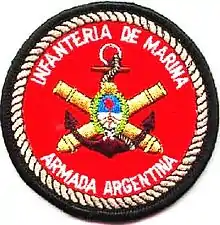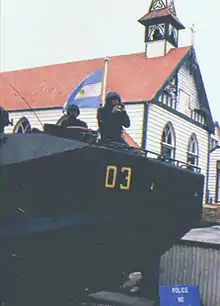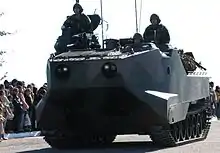Argentina Marines
The Naval Infantry Command (Spanish: Comando de la Infantería de Marina, COIM), also known as the Naval Infantry of the Navy of the Argentine Republic (Spanish: Infantería de Marina de la Armada de la República Argentina, IMARA) and generally referred to in English as the Argentine marines are the amphibious warfare branch of the Argentine Navy and one of its four operational commands.
| Argentine Navy Infantry | |
|---|---|
| Infantería de Marina de la Armada de la República Argentina | |
 IMARA insignia | |
| Active | 1807-present |
| Country | |
| Branch | |
| Type | Marines |
| Role | Amphibious Warfare |
| Size | 5,500 |
| Part of | |
| Motto(s) | PATRIAE SEMPER VIGILES (Always vigilant for the Fatherland) |
| March | Marcha de la Infantería de Marina (Marine march) |
| Anniversaries | 19 November 1879 |
| Commanders | |
| Current | Rear. Adm. Pedro Eugenio Galardi[1] |
The Argentine marines trace their origins to the Spanish Naval Infantry, which took part in conflicts in South America in the eighteenth and nineteenth centuries. Argentine marines took part in various conflicts of the nineteenth and twentieth century, notably the War of the Triple Alliance and the Falklands War. The marines (represented by the 5th Naval Infantry Battalion) are considered to have been among the best Argentine combat units present in the Falklands. The most recent war in which Argentine naval infantry took part was the Gulf War of 1990.
Today Argentine naval infantry are frequently deployed on UN peace-keeping missions.
History
The Marines trace their origins in Spanish Naval Infantry, at the time of the Viceroyalty of the Río de la Plata. After the Argentine War of Independence, it was under joint administration of the Argentine Army and the Argentine Navy. A 1946 law placed the marines solely under the jurisdiction of the Navy.
Battles and interventions
- Under Spanish dominion
- Conquest of the islas Malvinas in 1767.
- Malvinas Crisis (1770)
- Defense of the East Coast 1776.
- British invasions of the Río de la Plata 1806 and 1807.
- During independence
- seizure of Martin Garcia Island in 1814.
- Landing in Monterey, California, now part of the United States (1817–1818): 200 men commanded by Hipólito Bouchard, 130 of whom were armed with guns and 70 with lances, disembarked one league from the fort of Monterrey, in a creek hidden from the heights. The fort resisted only very weakly, and after an hour-long battle the Argentine flag was raised.
- Argentine confederation
- Cisplatine War. (1820s)
- Uruguayan Civil War (1842), against the forces under the control of Giuseppe Garibaldi.
- Anglo-French blockade of the Río de la Plata (1845)
- Paraguayan War (War of the Triple Alliance) (1845)

- 1963 Argentine Navy Revolt
- Snipe incident
- Dirty War (1976 to 1983)
- Falklands War (Spanish: Guerra de las Malvinas/Guerra del Atlántico Sur) (1982): Take over of the Falklands and South Georgia, and Battle of Mount Tumbledown, .
- Gulf War. (1990)
- UN Peacekeeper, observers/peace missions in Cyprus, Western Sahara, the Balkans, and Haiti.
Present
IMARA routinely train in joint exercises with similar units of Brazil, Chile and the United States.[2]
Current deployments
.jpg.webp)
IMARA has two Infantry Companies deployed in Haiti and Cyprus under the auspices of MINUSTAH[3] and UNFICYP respectively in joint operations with the Argentine Army and Argentine Air Force. A small platoon was also deployed in Serbia/UN Province Kosovo (NATO KFOR mandate), attached to Argentine Engineers Company, which was in turn attached to the Italian Brigade.
Several Marine Officers and NCO's are routinely deployed as military observers for the UN.
Structure
Argentine Marines have the same rank insignia and titles as the rest of the Argentine Navy, and are trained in the same institutions for officers and NCOs. Until the 21st century the Marine Corps Basic School provided post-graduate officer and basic enlisted training.
Fleet Marine Force (FAIF)
The FMF was formerly called the Brigada de IM No. 1 ( English: 1st Marine Brigade )
- 2nd Marine Corps Battalion
- 1st Amphibious Vehicles Battalion
- Amphibious Engineers Battalion
- Command and Logistical Support Battalion
- 1st Communications Battalion
- 1st Field Artillery Battalion
- Anti-aircraft artillery Battalion
- Amphibious Commandos Group (APCA)
Southern Marine Force (FAIA)
The SMF was formerly called the Fuerza de M No. 1. (English: 1st Marine Force)
- 4th Marine Corps Battalion
- 5th Marine Corps Battalion
- Naval Detachment Río Grande
River Operations Unit
- 3rd Marine Corps Battalion
Marine Security Forces
- Navy General Staff Security Battalion
- Puerto Belgrano Naval Base Security Battalion
- 15 Security Companies at Marine and Naval Air Bases.
Equipment
 Marines from Argentina line up in formation alongside U.S. Marines during the largest amphibious assault exercise in Latin America, UNITAS 45-04
Marines from Argentina line up in formation alongside U.S. Marines during the largest amphibious assault exercise in Latin America, UNITAS 45-04 LVTP7 of the Argentine Marine Infantry (IMARA), locally known as VAO (Vehiculo Anfibio a Orugas)
LVTP7 of the Argentine Marine Infantry (IMARA), locally known as VAO (Vehiculo Anfibio a Orugas) Panhard ERC 90 of the Argentine Marine Infantry (IMARA).
Panhard ERC 90 of the Argentine Marine Infantry (IMARA). LARC-5 and Humvee of the Argentine Marine Infantry (IMARA), locally known as VAR (Vehículo Anfibio a Ruedas).
LARC-5 and Humvee of the Argentine Marine Infantry (IMARA), locally known as VAR (Vehículo Anfibio a Ruedas).
See also
References
External links
| Wikimedia Commons has media related to Argentine Marines. |
- (in Spanish) Argentine Navy Official website
- (in Spanish) Argentine Marines official website
- (in Spanish) Argentine Marines Unofficial website
- (in Spanish) Organization and equipment
- (in Spanish) Argentine Marine Corps Association
- (in Spanish) Argentine Marine Fallen in Malvinas
- World Navies
- As part of his journey of reconciliation Mike Seers travels to Argentina to interview Marine artillery gunners whom he fought against
- Reassessing the Fighting Performance of the Argentine 5th Marines